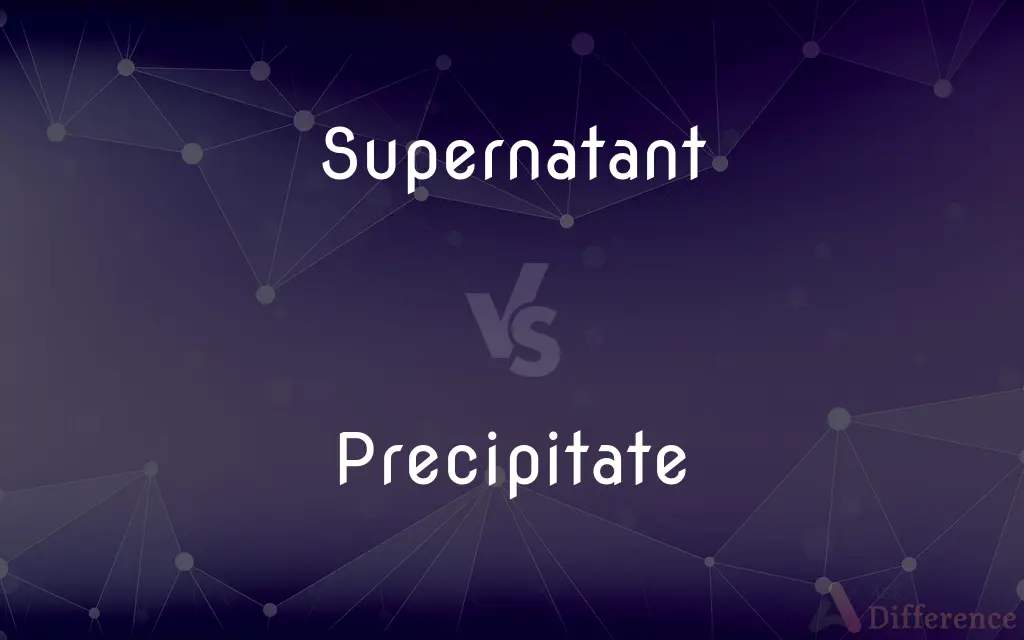Supernatant vs. Precipitate — What's the Difference?
Edited by Tayyaba Rehman — By Fiza Rafique — Updated on September 27, 2023
The supernatant is the clear liquid left behind after a precipitate has settled, while a precipitate is the solid that forms and settles out of a solution.

Difference Between Supernatant and Precipitate
Table of Contents
ADVERTISEMENT
Key Differences
The supernatant refers to the clear, upper layer of liquid that remains after a solid, known as the precipitate, has settled out of a solution. This separation typically occurs after centrifugation or simply letting a solution stand undisturbed.
In chemical reactions, when certain solutions are mixed, a solid can form and settle at the bottom. This solid is called the precipitate, while the remaining clear liquid on top is the supernatant.
The supernatant often contains solutes that remain dissolved in the liquid, while the precipitate contains the substances that have come out of the solution due to a change in conditions, like temperature or pH.
Analytical chemists and researchers frequently use the terms supernatant and precipitate. After a reaction, the precipitate is often collected and analyzed, while the supernatant might be discarded or further processed.
In conclusion, while the supernatant describes the clear liquid above a settled solid, the precipitate denotes the solid particles that have settled out from the solution.
ADVERTISEMENT
Comparison Chart
State of Matter
Liquid
Solid
Position in Solution
Top or above the settled matter
Settled at the bottom or within the liquid
Formed from
Remaining solvents and dissolved solutes
Insoluble compounds or particles
Clarity
Clear
Opaque, solid
Typical Treatment
Often discarded or further processed
Collected and analyzed
Compare with Definitions
Supernatant
The clear liquid above a settled solid.
After centrifugation, the cells formed a pellet and the clear supernatant was carefully removed.
Precipitate
The solid formed in a solution due to a chemical reaction.
When silver nitrate and sodium chloride mix, a white precipitate of silver chloride forms.
Supernatant
Liquid remaining after precipitation.
The supernatant was siphoned off, leaving behind the sediment.
Precipitate
To cause to happen, especially suddenly or prematurely
An announcement that precipitated a political crisis.
Supernatant
Residual liquid post-centrifugation.
The DNA was found in the supernatant, not in the solid phase.
Precipitate
To cause to fall down from a height; hurl downward
"The finest bridge in all Peru broke and precipitated five travelers into the gulf below" (Thornton Wilder).
Supernatant
The solution atop the precipitate in a container.
The chemist carefully pipetted the supernatant to avoid disturbing the crystals below.
Precipitate
To put suddenly into a certain state or condition
"He was like a man who had never known liberty and was all at once precipitated into it" (Taylor Caldwell).
Supernatant
Liquid fraction separated from the solid component.
The supernatant contained valuable enzymes for further study.
Precipitate
(Meteorology) To cause (a form of water, as rain or snow) to fall from the air.
Supernatant
Denoting the liquid lying above a solid residue after crystallization, precipitation, centrifugation, or other process
Carefully transfer the supernatant fluid into a 15 ml centrifuge tube
Precipitate
(Chemistry) To cause (a solid substance) to be separated from a solution.
Supernatant
A volume of supernatant liquid
The supernatants were filtered and analysed
Precipitate
(Meteorology) To fall from the air as a form of water, such as rain or snow.
Supernatant
Floating on the surface.
Precipitate
(Chemistry) To be separated from a solution as a solid.
Supernatant
The clear fluid above a sediment or precipitate.
Precipitate
Moving rapidly and heedlessly; speeding headlong.
Supernatant
Lying or floating above a denser fluid, or above a solid sediment or precipitate (which has been separated by crystallisation, centrifugation etc.).
Precipitate
Acting with or marked by excessive haste and lack of due deliberation.
Supernatant
The liquid that lies above a sediment or precipitate; supernate
Precipitate
Occurring suddenly or unexpectedly.
Supernatant
Material that floats on the surface of a liquid
Precipitate
(Chemistry) A solid or solid phase separated from a solution.
Supernatant
Swimming above; floating on the surface; as, oil supernatant on water.
Precipitate
A product resulting from a process, event, or course of action.
Supernatant
The liquid remaining after solids suspended in the liquid have been sedimented by gravity or by centrifugation. Contrasted with the solid sediment, or (in centrifugation) the pellet.
Precipitate
(transitive) To make something happen suddenly and quickly.
To precipitate a journey, or a conflict
It precipitated their success
Supernatant
A liquid lying above a sediment (floating on the surface)
Precipitate
(transitive) To throw an object or person from a great height.
Supernatant
Of a liquid; floating on the surface above a sediment or precipitate;
The supernatant fat was skimmed off
Precipitate
(transitive) To send violently into a certain state or condition.
We were precipitated into a conflict
Precipitate
To come out of a liquid solution into solid form.
Adding the acid will cause the salt to precipitate.
Precipitate
To separate a substance out of a liquid solution into solid form.
Precipitate
To have water in the air fall to the ground, for example as rain, snow, sleet, or hail; be deposited as condensed droplets.
It will precipitate tomorrow, but we don't know whether as rain or snow.
Precipitate
(transitive) To cause (water in the air) to condense or fall to the ground.
Precipitate
(intransitive) To fall headlong.
Precipitate
(intransitive) To act too hastily; to be precipitous.
Precipitate
Headlong; falling steeply or vertically.
Precipitate
Very steep; precipitous.
Precipitate
With a hasty impulse; hurried; headstrong.
Precipitate
Moving with excessive speed or haste; overly hasty.
The king was too precipitate in declaring war.
A precipitate case of disease
Precipitate
Performed very rapidly or abruptly.
Precipitate
A product resulting from a process, event, or course of action
Precipitate
(chemistry) a solid that exits the liquid phase of a solution
Precipitate
Overhasty; rash; as, the king was too precipitate in declaring war.
Precipitate
Lacking due deliberation or care; hurried; said or done before the time; as, a precipitate measure.
Precipitate
Falling, flowing, or rushing, with steep descent; headlong.
Precipitate the furious torrent flows.
Precipitate
Ending quickly in death; brief and fatal; as, a precipitate case of disease.
Precipitate
An insoluble substance separated from a solution in a concrete state by the action of some reagent added to the solution, or of some force, such as heat or cold. The precipitate may fall to the bottom (whence the name), may be diffused through the solution, or may float at or near the surface.
Precipitate
Atmospheric moisture condensed as rain or snow, etc.; same as precipitation{5}.
Precipitate
To throw headlong; to cast down from a precipice or height.
She and her horse had been precipitated to the pebbled region of the river.
Precipitate
To urge or press on with eager haste or violence; to cause to happen, or come to a crisis, suddenly or too soon; as, precipitate a journey, or a conflict.
Back to his sight precipitates her steps.
If they be daring, it may precipitate their designs, and prove dangerous.
Precipitate
To separate from a solution, or other medium, in the form of a precipitate; as, water precipitates camphor when in solution with alcohol.
The light vapor of the preceding evening had been precipitated by the cold.
Precipitate
To dash or fall headlong.
So many fathom down precipitating.
Precipitate
To hasten without preparation.
Precipitate
A precipitated solid substance in suspension or after settling or filtering
Precipitate
Separate as a fine suspension of solid particles
Precipitate
Bring about abruptly;
The crisis precipitated by Russia's revolution
Precipitate
Fall from clouds;
Rain, snow and sleet were falling
Vesuvius precipitated its fiery, destructive rage on Herculaneum
Precipitate
Fall vertically, sharply, or headlong;
Our economy precipitated into complete ruin
Precipitate
Hurl or throw violently;
The bridge broke and precipitated the train into the river below
Precipitate
Done with very great haste and without due deliberation;
Hasty marriage seldom proveth well
Hasty makeshifts take the place of planning
Rejected what was regarded as an overhasty plan for reconversion
Wondered whether they had been rather precipitate in deposing the king
Precipitate
Insoluble substance that settles out of a solution.
The experiment resulted in a yellow precipitate at the bottom of the flask.
Precipitate
Solid substance separated from a liquid phase.
The sudden temperature change caused a precipitate to form in the liquid.
Precipitate
Matter that has transitioned from dissolved to solid form.
By adjusting the pH, we can force certain compounds to precipitate out.
Precipitate
Resultant solid after a solute exceeds its solubility.
The saturated solution yielded a crystalline precipitate upon cooling.
Common Curiosities
Why do precipitates form in solutions?
Precipitates form when the solubility of a substance is exceeded or due to a chemical reaction that produces an insoluble compound.
What is a precipitate?
A precipitate is the solid that forms and settles out of a solution.
What is a supernatant?
The supernatant is the clear liquid left behind after a precipitate has settled.
Can changes in temperature cause precipitation?
Yes, changes in temperature can affect solubility, leading to the formation of a precipitate.
Is the supernatant always clear?
Ideally, the supernatant is clear, but it might be slightly cloudy if some fine precipitate remains suspended.
Is the supernatant always discarded?
No, depending on the purpose of the experiment or process, the supernatant might be further analyzed or processed.
How is the supernatant separated from the precipitate?
The supernatant can be separated from the precipitate through decanting, pipetting, or centrifugation.
Can the supernatant contain dissolved solutes?
Yes, the supernatant can still contain solutes that remain dissolved in the liquid.
Can the supernatant be colored?
Yes, the supernatant can be colored if it contains colored dissolved solutes.
Can precipitates redissolve in a solution?
Some precipitates can redissolve under changed conditions like temperature or pH, while others remain insoluble.
How can a precipitate be collected?
A precipitate can be collected by filtration or centrifugation and then dried.
How do researchers ensure that all the precipitate has settled?
Techniques like centrifugation or allowing the solution to stand for an extended period help in settling all the precipitate.
Are precipitates always solids?
Generally, precipitates refer to solids that form in solutions, but in broader contexts, it can also refer to liquids that separate out.
How can one increase the size of precipitate particles?
Slow addition of reactants or gentle stirring can lead to larger precipitate particles.
Why is it important to remove all supernatant from a precipitate?
Complete removal ensures that no contaminants or unwanted solutes are carried forward with the precipitate.
Share Your Discovery

Previous Comparison
Persist vs. Persevere
Next Comparison
Stereo vs. RadioAuthor Spotlight
Written by
Fiza RafiqueFiza Rafique is a skilled content writer at AskDifference.com, where she meticulously refines and enhances written pieces. Drawing from her vast editorial expertise, Fiza ensures clarity, accuracy, and precision in every article. Passionate about language, she continually seeks to elevate the quality of content for readers worldwide.
Edited by
Tayyaba RehmanTayyaba Rehman is a distinguished writer, currently serving as a primary contributor to askdifference.com. As a researcher in semantics and etymology, Tayyaba's passion for the complexity of languages and their distinctions has found a perfect home on the platform. Tayyaba delves into the intricacies of language, distinguishing between commonly confused words and phrases, thereby providing clarity for readers worldwide.














































